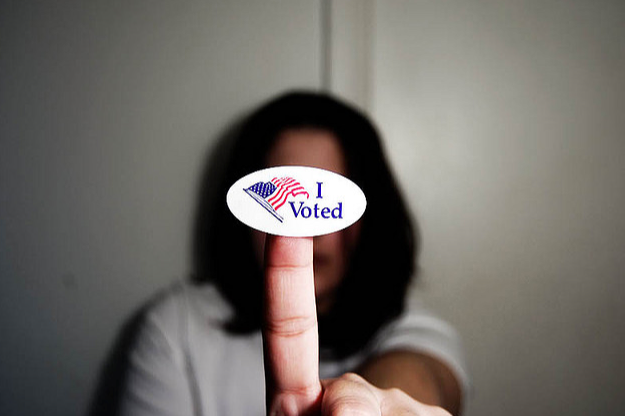It looked like the election was over after the third debate.
According to the polling average on Real Clear Politics, Democratic nominee Hillary Clinton had a comfortable lead of 4.6 percent Oct. 28. As with the previous debates, Republican nominee Donald Trump had lost again with most voters according to exit polls. The vulgar billionaire appeared to recognize that his candidacy wasn’t going to end in victory and started to complain about a “rigged” election as if it was going to be his defense a day after his concession speech.
Then, the FBI jumped into the fray.
Director James Comey announced the discovery of new emails from Clinton’s infamous private email server in what was quite the October surprise. Specifically, the FBI found the emails during another investigation into the disgraced New York Democratic politician, Anthony Weiner. Weiner is now famous less for politics and more for the discovery of sending sexually explicit messages to underage girls. It just so happens that Weiner’s estranged wife is Huma Abedin, a top aide in Clinton’s staff.
Clinton and her allies knew what this meant immediately. Comey and the FBI have been ferociously attacked by Clinton, her senior campaign advisers and surrogates in the media. It was only months ago that Clinton praised the FBI director for the way he finalized the initial investigation, which involved pressing no charges on her.
Biased media and imbalanced fact-checkers do Americans a disservice
Even though Comey has now said the FBI found no criminality, the damage has been done. On Nov. 6, the Real Clear Politics showed that Clinton’s lead had narrowed to 1.8 percent. After releasing the Marquette Law School poll Tuesday, pollster Charles Franklin said he noticed a big shift among voters from those polled before the FBI announcement to those polled just after it.
It is now clear that this election will be close. My first prediction is that the winner will likely lead with a margin of around 4 percent or less, and not win with a majority. History from four years ago takes part in this.
On the day of the 2012 election, the Real Clear Politics average showed now-President Barack Obama ahead by only 0.7 percent, but he won by a margin of 3.9 percent. This is because there were voters still undecided right until the day of the election, which is the same this time around. Add in the third parties, and you can see why there’s plenty of uncertainty.
More than half a million people have already voted in Wisconsin
My second prediction is that Clinton will come out ahead. She didn’t get my vote, but I think her campaign infrastructure and discipline will get her past the 270 mark. More specifically, I think she will have 323 electoral votes to Trump’s 215.
The term “ground game” in politics refers to a campaign’s offices and volunteers who get out the message of a presidential nominee. In many battleground states, Clinton outperforms Trump. Most of the Republican nominee’s ground game relies on local party offices, many of which are focusing on additional elections from the Senate to municipalities.
Why is ground game important? Let’s look at the Iowa caucus. Polls showed Trump winning the state and appearing inevitable. Instead, Sen. Ted Cruz, R-Texas, declared victory that night, which can be attributed to his significantly powerful campaign infrastructure. Trump’s campaign has never seemed to understand the importance of ground game, this will cost him many states, including Wisconsin.
It is true that enthusiasm among key Democratic voting groups is down. It has been reported that black voter turnout is not what is was during Obama’s two victories in 2008 and 2012.
But the same can be said among Republicans. Utah, a state that has reliably voted Republican, is now tight due to the rise of independent conservative Evan McMullin and dissatisfaction of Trump among its predominantly Mormon electorate. It will probably still go to Trump, but not by as large of a margin as Republicans should expect.
Vice President Joe Biden encourages young voters to go to the polls in Madison
I think Trump does have a chance to surprise us, but this depends on getting high turnout among white voters that lack college educations. It is these voters that are angry at the gloomy economic situation, rising illegal immigration and political establishment.
Following the 2012 election, political analyst Sean Trende found a decrease in turnout among voters in this demographic group, which would have likely helped Mitt Romney. He believed it is feasible for the GOP to win by creating an attractive platform to these voters. Trump has been able to do that with registered voters, but the great challenge for him is to bring out those who don’t participate in the political system.
I’ve regularly written that both presidential candidates are highly unpopular. This means that in the end, whoever loses will be responsible for their own defeat. In Trump’s case, it will be because of inflammatory rhetoric and a lack of campaign experience. In Clinton’s case, it will be a result of her elitism, corruption with lobbyists and despicable conduct in the State Department. In both cases, a defeat will be attributed to lack of support among independents and party bases.
More simply, the fact that one night before one of the most historic moments in U.S. history voters are still asking themselves the same question they’ve pondered for months — which poison would I rather take?
John M. Graber ([email protected]) is a junior majoring in history and political science.














